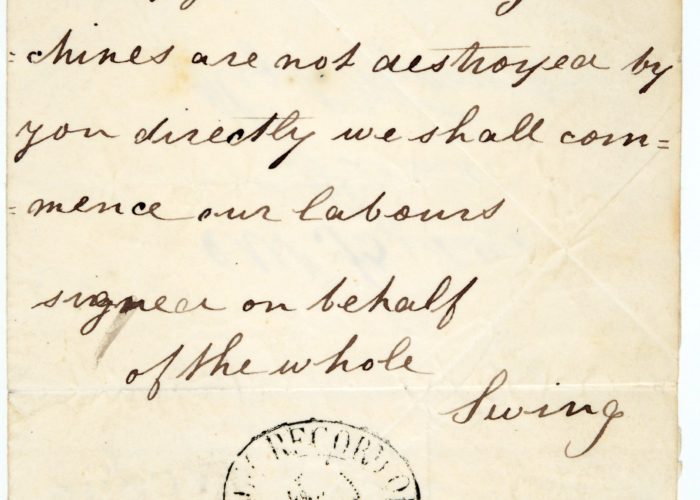Captain Swing letter to Mr Biddle, farmer, High Wycombe
Theme: Social and cultural revolution, Challenging law and order: British riots and reforms, The impact of industry
In the 1700s, work was localised and family-orientated, largely agricultural and driven by hand and horse labour. But innovations in steam power and the design of machinery in the late 1700s and early 1800s transformed manufacturing and the way people lived and worked. In the 1820s and 30s, factors such as increasing industrialisation, poor harvests and, specifically, the introduction of the threshing machine meant farming wages were low, working conditions poor and unemployment high. Agricultural workers in the South and East of England protested in what became known as the Swing riots (or agricultural labourers’ risings).
For agricultural workers, the autumn and winter were particularly difficult times of the year with far less work available than in the spring and summer. One of the main jobs at this time was threshing – separating grain from the stalks. The introduction of threshing machines in the late 1820s and early 1830s put large numbers of labourers out of work. They protested in response, calling for the removal of the machines, better wages and working conditions.
One of the key forms of protest was through threatening letters, sent to farmers and land owners in the autumn and winter of 1830. These letters were signed ‘Swing’ or ‘Captain Swing’ , a fictional character used to ensure the senders’ anonymity – much like the Luddites, who signed their letters from Captain (or sometimes General or King) Ludd. Protesters also destroyed threshing machines and set fire to buildings and hayricks. Over 1400 separate incidents were recorded.
The authorities reacted harshly to the Swing rioters, fearful that these protests could escalate into a revolution like the recent French Revolution. 1,976 people were put on trial, 252 were sentenced to death (with 19 eventually executed), 644 jailed and 505 transported to penal colonies in Australia.
Did you know..?
The first agricultural labourers’ union was set up by Joseph Arch as late as 1872.
Transcript:
Sir,
This is to acquaint you
that if your threshing ma –
chines are not destroyed by
you directly we shall com –
mence our labours
signed on behalf of the whole
Swing
Use our Classroom resources to investigate this object and the theme of Protest further.
Highlights:
- Using objects, artworks and other sources to find out about the past
- Enquiry: Why did workers protest in the Age of Revolution?
- How to make an interactive Revolutionary banner
- Twitter campaigns
And much more…
Sources & acknowledgements
This object description and its related educational resources were researched and written by our team of historians and education specialists. For further information see the item’s home museum, gallery or archive, listed above.
-
Did you know..?
The first agricultural labourers’ union was set up by Joseph Arch as late as 1872.
-
Education overview
You can access a range of teachers resources related to this object and more on our education page.
Please also see our glossary of terms for more detailed explanations of the terms used.
-
Curatorial info
- Originating Museum: National Archives
- Accession Number: HO 52/7 (229)
- Production Date: 1830
- Material: Paper
- Original record
-
Use this image
You can download this image for personal and educational use but please take note of the license type and rights holder information.
- Rights Holder: © National Archives
- License Type:



